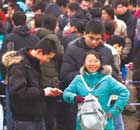Top Biz News
Govt may tell steelmakers that big is not better
(China Daily)
Updated: 2010-02-05 10:28
 |
Large Medium Small |
SHANGHAI: China, the world's largest steel producer, may pull back from encouraging steelmakers to get as large as global leader ArcelorMittal, as it directs mills to focus on improving product quality, a government advisor said.
"We want them to focus on upgrading technologies, product quality and environmental standards," said Li Xinchuang, who is helping to draft a new steel policy as head of the China Metallurgical Industry Planning and Research Institute. "Big is not necessarily good. ArcelorMittal suffered too much last year."
The rethink underscores China's efforts to close obsolete plants and tighten credit to prevent overcapacity from depressing prices and hurting profits at steelmakers including Baosteel Group Corp. ArcelorMittal, formed from the industry's largest takeover in 2006, may post a $389 million loss for 2009 after the recession cut demand, according to analysts' estimates.
"Getting bigger means steelmakers will face problems in efficiency and high management costs," said Xu Xiangchun, chief analyst with Mysteel Research Institute. "The crisis made people realize that big is not always better."
Baoshan Iron & Steel Co, the Shanghai-listed unit of Baosteel, fell 0.5 percent to 7.60 yuan yesterday, taking this year's decline to 21 percent on concern efforts to tighten credit will slow demand.
Better performance
ArcelorMittal produced 103.3 million metric tons of steel in 2008, according to the latest figures from the World Steel Association. Hebei Iron & Steel Group overtook Baosteel as China's largest mill last year, with 40.24 million tons of output, according to research company Custeel.com.
The new industry policy may be released soon, China Metallurgical's Li said, without giving a specific timeframe. In a November version of the policy draft, the government was considering asking steelmakers to merge to create one or two producers with annual capacity of 100 million tons by 2015.
The government may instead encourage steelmakers to get as big as 50 million tons in capacity through domestic consolidation, Li said. "During the crisis, the smaller companies performed better than bigger ones," he said.
Market needs
"We should try our best to improve our quality to meet market needs," Li said. Steelmakers need to do better to meet requirements from shipbuilders and automakers, he said.
Chinese steelmakers face rising import competition from Japan, China Iron and Steel Association said in October.
Steel product imports jumped 14 percent to 17.6 million tons last year, partly as local producers couldn't meet demand for higher-grade material, Li said. Domestic mills should seek to displace 2 million tons of imports this year, he said.
Steelmakers would be encouraged "to pay more attention to environmental issues" in the new industry policy, he said.
There would be details on energy savings, carbon and other emission reductions that the government wants to see, he said, without elaborating.
Bloomberg News













